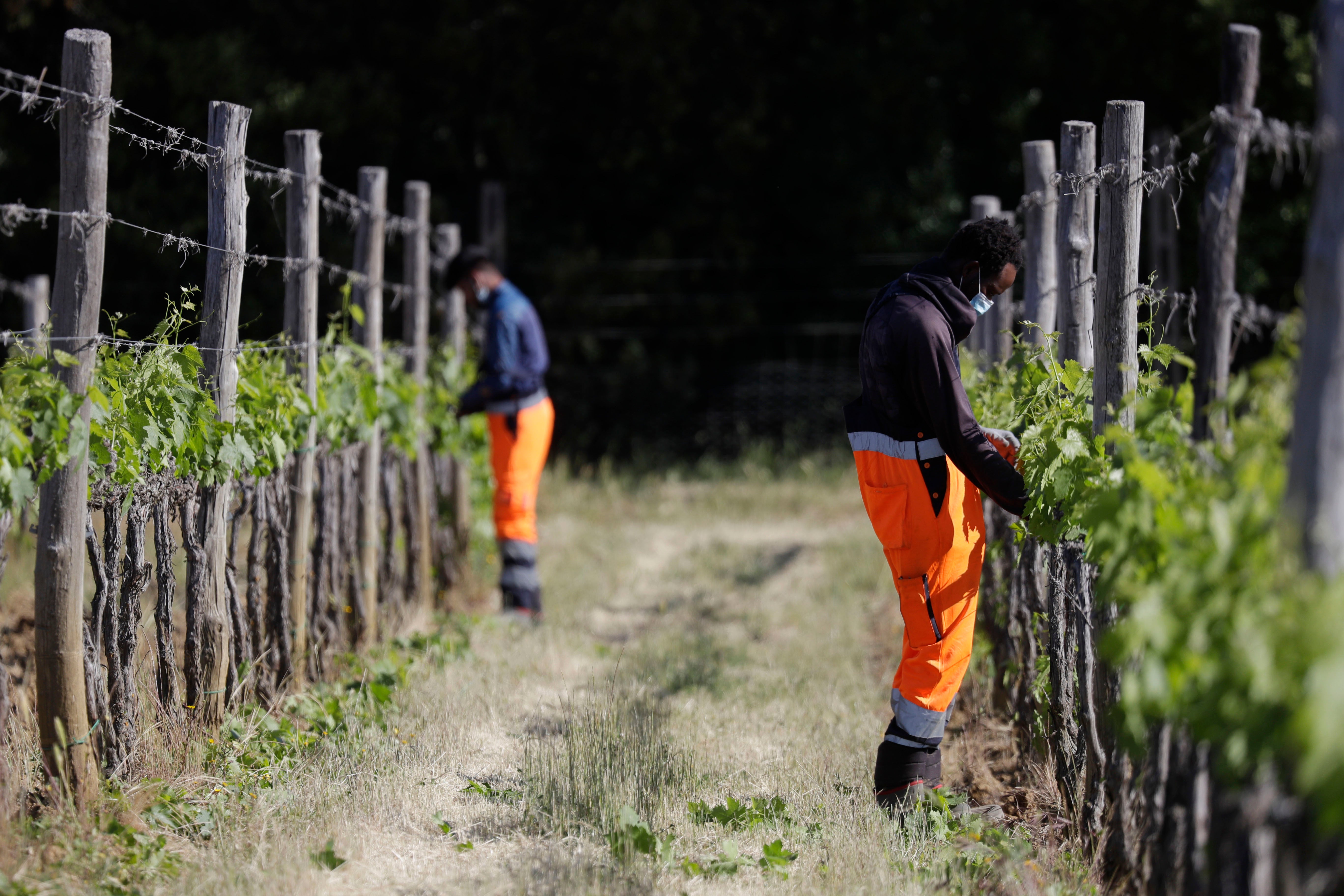Asylum-seekers help produce Italy's famous Brunello wine
Summer is arriving in Tuscany’s wine country

Your support helps us to tell the story
From reproductive rights to climate change to Big Tech, The Independent is on the ground when the story is developing. Whether it's investigating the financials of Elon Musk's pro-Trump PAC or producing our latest documentary, 'The A Word', which shines a light on the American women fighting for reproductive rights, we know how important it is to parse out the facts from the messaging.
At such a critical moment in US history, we need reporters on the ground. Your donation allows us to keep sending journalists to speak to both sides of the story.
The Independent is trusted by Americans across the entire political spectrum. And unlike many other quality news outlets, we choose not to lock Americans out of our reporting and analysis with paywalls. We believe quality journalism should be available to everyone, paid for by those who can afford it.
Your support makes all the difference.Summer is arriving in Italy's wine country in Tuscany and the leaves on the vines shimmer in gold and green.
Yahya Adams moves his gloves through the foliage, removing excess buds and shoots to make the vines stronger.
He's among 24 asylum-seekers from Africa and Asia who are working in vineyards of Tenute Silvio Nardi on this year's crop of Brunello di Montalcino, one of Italy's most famous wines.
They come from Ghana Togo, Sierra Leone, Guinea Bissau, Pakistan and other countries, with no prior experience in wine-making. But they have found temporary work here through a local non-profit group that helps asylum-seekers find legal employment in vineyards or olive groves while their claims are being processed.
Adams, a 21-year-old from Ghana, is enjoying learning the craft.
“I like to study how the plant grows and I want to improve in this job,” he said. "And one day, I could teach others who arrive how to do the work, how to manage the plants, everything.”
Adams left Ghana when he was just 14 to search for work abroad. He spent two years in Libya a conflict-ridden North African country where many migrants hoping to reach Europe face abuse and extortion from ruthless human smugglers.
Adams said he was temporarily held in captivity in Libya and considered going home to Ghana before making it to Italy on a ship with 118 other migrants. After living in centers for unaccompanied minors, he tried to find work in Belgium, but returned to Italy, where he is now enrolled in the agricultural work program of the Cooperativa Agricola San Francesco.
The NGO aims to bring asylum-seekers into the labor market with the same pay and working conditions as Italians, keeping them away from the off-the-books system known as “caporalato” in which migrant workers often get exploited. The phenomenon is widespread among seasonal workers in the agricultural sector, where almost 40% are hired irregularly, according to the Placido Rizzotto Observatory, a union watchdog group monitoring the infiltration of organized crime in agriculture.
“Some of them, they can tell you, for three or four years they worked in the black market, with no contract, nothing, so they did not exist. They didn’t have social security, nothing. Here they have a contract, there is hope,” said Salis Godje, who co-ordinates the program for Cooperativa Agricola San Francesco.
Godje, who came to Italy from Togo as a student and received a degree in economics, said the asylum-seekers selected for the program are given a training course to learn the basics of vineyard work. After that they do three seasonal stints in the vineyard, pruning in the winter and summer and harvesting in the fall.
Nicola Peirce, the president of the NGO, said the workers are paid around 7 euros ($8.52) an hour and work eight hours a day, in line with Italian union requirements for agricultural work. Others who end up working irregularly often earn half as much while working longer hours.
The program is now in its second year at Tenute Silvio Nardi, a family-owned winemaker established in the 1950s in hills of Casale del Bosco. It annually produces 210,000 bottles of wine made with Sangiovese grapes, including 160,000 bottles of Brunello di Montalcino, which is aged for five years before release.
The asylum-seekers work in teams of eight over 15 hectares (40 acres), pruning vines under the supervision of agronomist Vittorio Stringari.
“You need to have some patience in the beginning," Stringari said. “Like with everyone who starts a new job, there is a phase of apprenticeship. But given that they are very motivated ... they very quickly fill the technical gap.”
Adams considers himself lucky to have a job that he likes and from which he earns enough to send some money to his family in Ghana.
“If I had this work in my country, I would not go anywhere," he said.
___
“One Good Thing” is a series that highlights individuals or groups whose actions provide glimmers of joy in hard times — stories of those who find a way to make a difference, no matter how small. Read the stories at https://apnews.com/hub/one-good-thing
___
Follow all AP stories on migration issues at https://apnews.com/hub/migration.
___
Associated Press religion coverage receives support from the Lilly Endowment through The Conversation U.S. The AP is solely responsible for this content.
Subscribe to Independent Premium to bookmark this article
Want to bookmark your favourite articles and stories to read or reference later? Start your Independent Premium subscription today.